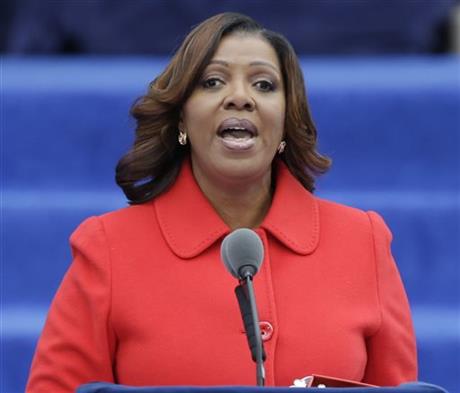
By JENNIFER PELTZ
After a police officer wasn’t indicted in a fatal chokehold caught on video, some officials are reviving calls to entrust such cases to special prosecutors, rather than local district attorneys.
The city’s elected public advocate and some state lawmakers are pressing for appointing special state prosecutors for police killings, saying Eric Garner’s death has bared problems with having DAs lead investigations and prosecutions of the police who help them build cases. Similar legislation has been proposed in Missouri since the police shooting of an unarmed 18-year-old in Ferguson.
“This is a watershed moment,” New York Public Advocate Letitia James said by phone. “It’s clear that the system is broken and an independent prosecutor is needed.”
She’s advocating appointing such prosecutors whenever police kill or seriously injure someone. Assemblymen Karim Camara and Marcos Crespo are proposing special prosecutors for police killings of unarmed people.
Gov. Andrew Cuomo said last week on CNN’s “The Situation Room with Wolf Blitzer” that the state should examine whether DAs should bring such cases and “potential roles for special prosecutors,” as part of a broad look at the criminal justice system.
After Garner died July 17, the Staten Island district attorney’s office took the case to a grand jury that spent two months hearing from 50 witnesses and scrutinizing evidence including police policy manuals, medical records and four videos, according to the few details released.
Medical examiners had found that a police chokehold — a maneuver banned by police policy — caused Garner’s death. Officer Daniel Pantaleo’s lawyer argued the officer used a permissible takedown. Grand jurors decided Wednesday that no criminal charges were warranted.
The decision spurred protests and questions about how prosecutors conducted the secret process. And it has prompted debate over whether special prosecutors would build public trust or undermine a system set up to put tough decisions in elected prosecutors’ hands.
“There has to be a permanent special prosecutor for police misconduct because of the inherent conflict” in tasking local prosecutors with exploring allegations against the police who are often their partners, said civil rights lawyer Norman Siegel.
But DAs bristle at the implication that they’re too close to police for public comfort.
“Why would the people’s choice to be their elected law enforcement officer be disqualified in favor of some political appointment?” said Onondaga County District Attorney William Fitzpatrick, the Syracuse prosecutor who is president-elect of the National District Attorneys Association.
Brooklyn District Attorney Kenneth Thompson said Friday he expects to take a recent deadly police shooting of an unarmed man in a public housing stairwell to a grand jury, rejecting suggestions that a special prosecutor take over.
“I was elected by the people of Brooklyn to do this job without fear or favor, and that is exactly what I intend to do,” Thompson said.
Special prosecutors sometimes have been tapped for cases involving police, including allegations that a former Chicago police commander oversaw the torture of dozens of suspects to coerce confessions. He was never charged with abuse but was convicted of perjury.
Some states have established permanent special prosecutors’ offices for various types of cases. Maryland’s handles everything from election law violations to misconduct by public employees, including police.
But the idea of a special prosecutor specifically for police has a particular history in New York. The state created a state special prosecutor’s office in 1972 to explore police corruption in New York City, responding to the allegations later chronicled in the 1973 film “Serpico.”
The office was sometimes accused of overreaching — unfairly, says Pace University law professor Bennett Gershman, who worked in the office in its early years.
“There was some pressure not necessarily to charge, but to look closely at these cases and try hard to see whether or not there is an innocent explanation or whether or not the officer really did break the law,” he recalled.
Then-Gov. Mario Cuomo, the current governor’s father, disbanded the special prosecutor’s office in 1990, citing budget constraints. Calls to reinstate and extend it to police misconduct and brutality allegations have arisen over the years, including after three officers were acquitted in the fatal shooting of an unarmed man on his wedding day in 2006.
Some DAs have set up their own separate units for allegations against police. But prosecutors say in any event, they have enough distance from police to investigate them.
“We view ourselves as an independent agency that is called upon, on a daily basis, to review the work of the police,” said Erie County District Attorney Frank Sedita, the Buffalo prosecutor who heads the state DA’s association. While they work closely together, “in my office, there’s not a week that goes by that there’s not some disagreement between prosecutors and police.”



